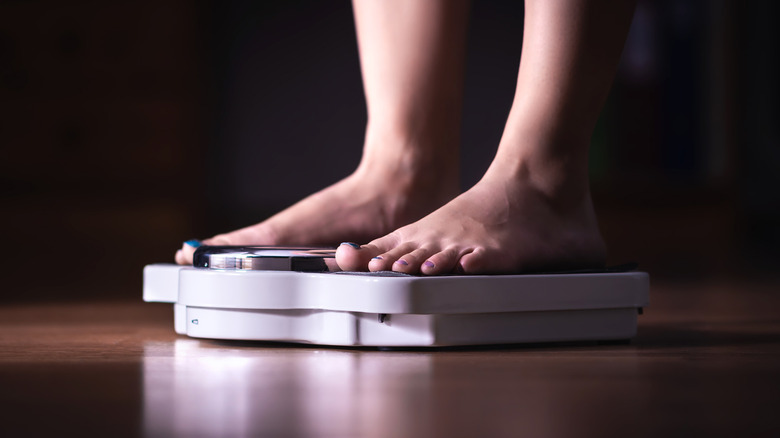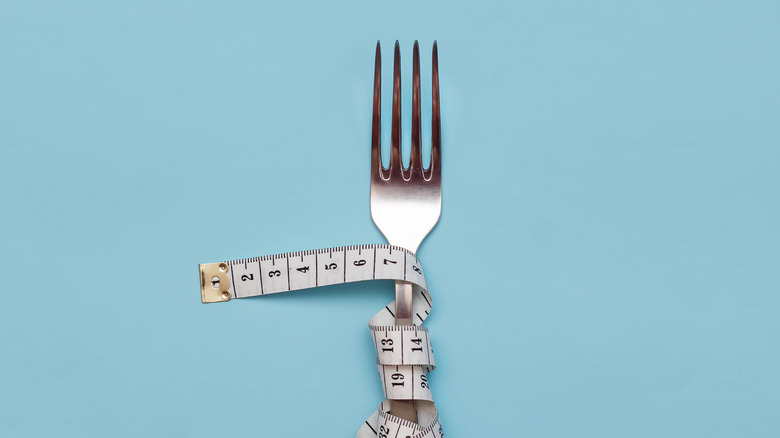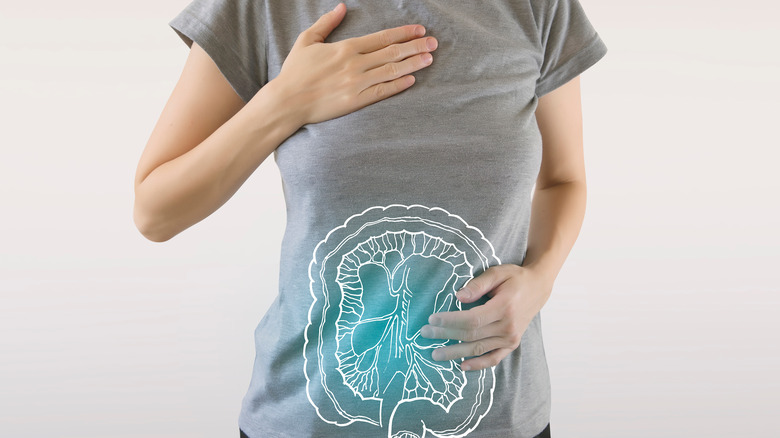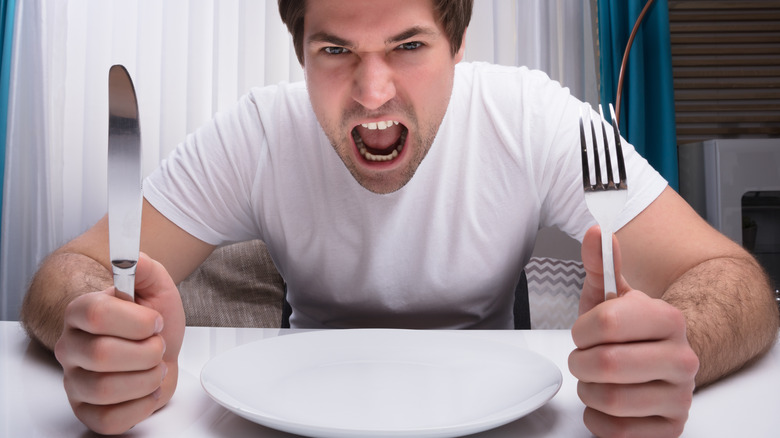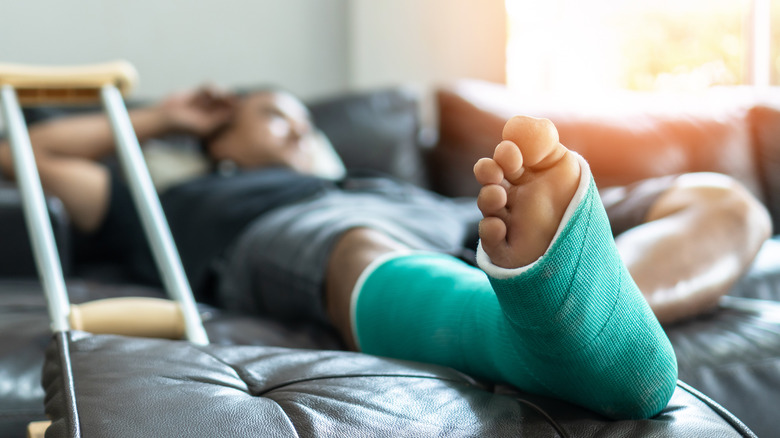The Criticism Against The 1,200 Calorie Diet Fully Explained
It may seem like 1,200 is the magic calorie count when it comes to weight loss. Even the National Institute of Health published a 1,200-calorie meal plan. Where does this number come from, though? It represents the fewest calories an "average" person can eat without negatively impacting their health, registered dietitian Justine Roth told U.S. News & World Report. As Medical News Today explained, "If people consumed only the number of calories needed every day, they would probably have healthy lives. Calorie consumption that is too low or too high will eventually lead to health problems."
Now, this doesn't necessarily mean that the 1,200-calorie diet is the best option out there for everyone. What works for one person may not work for another, as people vary greatly — in size, activity level, age, etc. As such, the 1,200-calorie diet is not a one-size-fits-all solution for weight loss. It's always a good idea to consult your doctor or a registered nutritionist before embarking on any kind of diet. Here's a look at what you can expect if it's decided that a 1,200-calorie route is safe for you.
If you are struggling with an eating disorder, or know someone who is, help is available. Visit the National Eating Disorders Association (NEDA) website or contact NEDA's Live Helpline at 1-800-931-2237. You can also receive 24/7 Crisis Support via text (text NEDA to 741741).
You will initially lose weight on the 1,200-calorie diet
For many, the whole purpose of dieting is to lose weight. Well, with 1,200 calories, you're likely to do just that. Creating a calorie deficit is necessary for weight loss, but it's the amount of calories cut that needs to be considered.
Multiple studies have shown that 1,200 calories can promote weight loss. One study published in Nutrition & Diabetes found that over 2,000 obese individuals who were following a medically supervised 1,200 calorie meal replacement diet lost an average of 4.7% of fat in a 12 month time span. Another study published in The American Journal of Clinical Nutrition followed individuals participating in a commercial weight-loss program, with one offering 1,200 to 1,500 calories per day.
After a year of following the diet, individuals in that group experienced an average weight loss of 6.8 kg (15 pounds). That may sound like a success, but it's worth noting that 23% of the individuals following the calorie restriction dropped out of the study.
The weight you lose on the 1,200-calorie diet may be followed by weight gain
You're seeing results from following a 1,200-calorie diet, but how long will those results last? Research shows that weight loss happens initially when following a low-calorie diet but tends to backfire in the long run.
"The fewer calories you eat, the slower your metabolic rate will be," registered dietitian Justine Roth told U.S. News & World Report. "It's like a car running on low gas — it's going to not go as fast when you push on the pedal, and the air conditioning might not work well because it's trying to conserve all of its fuel. The body does the same thing: It's not going to speed up burning calories if you aren't giving it enough to do so."
Although 1,200 calories may lead to weight loss at first, weight gain may eventually follow. And that doesn't always mean you'll just bounce back to your pre-diet weight. "One third and two thirds of dieters regained more weight than they lost initially," a 2017 article published in Perspectives on Psychological Science explained.
The 1,200-calorie diet won't meet your estimated calorie needs
For many adults, 1,200 calories just doesn't fit the bill when it comes to the amount needed to keep going each day. Calorie needs are dependent on various factors including a person's age, sex, height, weight, and physical activity. Your goals are another factor to consider: Do you want to lose, maintain, or gain weight?
The 2015-2020 Dietary Guidelines revealed that calorie estimates range from 1,600 to 2,400 calories per day for adult women and 2,000 to 3,000 calories per day for adult men. The low end of the calorie scale is for people who are sedentary while the high range is more typical for individuals who are quite active. Even older children and adolescents have a calorie range above 1,200 — falling between 1,400 to 3,200 calories each day. As the guidelines demonstrate, 1,200 calories only meets the estimated calorie needs for most children up until the age of seven.
As you get older, your basal metabolic rate (metabolism) slows, therefore calorie needs start to decline. Individualized calorie needs can be determined by a registered dietitian.
The 1,200-calorie diet is a bad fit for athletes
If you're a recreational athlete or an otherwise very active person, it's not uncommon to want to lose body fat while maintaining lean tissue in order to excel at your sport. The problem is that 1,200 calories isn't even enough for an adult male or female without exercise.
A 2015 study published in Sports Medicine states that athletes and active individuals expend a high amount of energy with exercise. This varies depending on exercise type, duration, and intensity. Although it's tempting to restrict calories to see quick weight-loss results, this approach should not be done along with intense endurance or strength training programs. You are putting yourself at risk for health consequences, including decreased muscle strength, concentration, and coordination as well as an Increased risk of injury due to poor nutrient intakes and loss of lean tissue.
Regardless of the reason behind wanting to lose weight, a registered dietitian (especially one trained in sport nutrition) can help identify a goal weight and calorie intake without the need to incorporate extreme diets or dangerous weight loss practices.
Only eating 1,200 calories a day can lead to negative side effects
Since your body needs a minimum amount of fuel to survive (even without activity), it's understandable that you will start feeling some negative side effects when limiting your calorie intake. Specific side effects you may notice include dizziness, extreme hunger, gallstones, nausea, headaches, and fatigue, among others.
Gallstones — hard, pebble-like pieces of material that form in the gallbladder — are one of the more serious side effects you may encounter. Gallstones block the bile ducts of your biliary tract, which causes pain in your upper right abdomen. This type of pain is frequently called a "gallbladder attack," according to National Institute of Diabetes and Digestive and Kidney Diseases.
When you're not eating for a prolonged period of time or you're losing weight quickly, your liver releases extra cholesterol into the bile (which is usually what gallstones are made of). Fast weight loss can also cause the gallbladder to empty improperly. This is another reason it's recommended you have a discussion with a medical professional before restricting your calories, as is required on the 1,200-calorie diet.
Metabolic changes may occur on the 1,200-calorie diet
Our complex bodies adjust to survive if needed. This includes our metabolism, which is the function of our body that converts what we eat and drink into energy. Mayo Clinic explained that even when we're resting, we need calories (aka energy) for functions such as breathing, circulating blood, growing and repairing cells, as well as adjusting hormone levels. All of the calories we need to carry out these basic functions is called our basal metabolic rate.
When calorie restriction begins, these metabolic changes kick in. Increases in hormones such as ghrelin and cortisol occur, which drive hunger, and resting metabolic rate (the calories you burn at rest) drops. A 2011 study published in the New England Journal of Medicine wanted to understand the reason behind the high rate of weight gain after diet-induced weight loss. The results found that even after one year of the initial weight reduction, levels of hormones that increase appetite and encourage weight regain do not go back to the levels recorded before the weight loss.
The 1,200-calorie diet could lead to dangerous yo-yo dieting
Yo-yo dieting (aka weight cycling) is "the pattern of losing weight, regaining it and then dieting again," according to Healthline. A 2017 article published in the Journal of Obesity & Metabolic Syndrome explained that diets that tend to restrict individuals to small amounts or special kinds of food are more exposed to this cycling. Since the chance of gaining weight after dieting is so common, the likelihood of weight cycling is also high. It can vary, but typically 20-35% of men and 20-55% of women will experience it.
With yo-yo weight loss and gain comes potential cardiovascular risks. This could include fluctuations in blood pressure, heart rate, cardiac workload, and blood glucose and lipids. Other health consequences that can arise from constant repeated dieting and weight cycling include increased risk for eating disorders, psychological disorders, bone fractures, type 2 diabetes, cancer, and even death.
You risk nutrient deficiency on the 1,200-calorie diet
When you limit your daily calories, you may also be limiting the number of vitamins and minerals you're consuming. According to the Academy of Nutrition and Dietetics, there are several nutrients that are already lacking in the average American's diet. They include calcium, choline, magnesium, potassium, and vitamins A, C, D, and E.
One 2012 study published in Nutrition Journal found that obese individuals undergoing a low-calorie diet dealt with micronutrient deficiencies. Prior to the study, the participants followed a "calorie-rich but nutrient-poor" diet. After three months of a reduced calorie diet, micronutrient levels were even further reduced. This was especially true for vitamin C, zinc, and lycopene (an antioxidant). Calorie restriction was shown to limit the intake of important micronutrients, but it can also affect a person's consumption of macronutrients such as carbohydrates and protein.
Not getting in necessary amounts of nutrients can lead to health issues including digestive problems, skin disorders, and weak bones. If you have a nutrient deficiency, you may notice symptoms like fatigue, weakness, constipation, unusual food cravings, and/or pale skin.
The 1,200-calorie diet may have you feeling hangry
You're at your max intake of calories for the day, but your belly is rumbling for some food. Being hungry on a regular basis is a tell-tale sign that you're not eating enough. Our body has hunger hormones like leptin, which "helps regulate and alter long-term food intake and energy expenditure," according to Hormone Health Network. Leptin helps to stop hunger and regulate energy balance so that the body doesn't ask for food when it doesn't need it. On the other hand, when this hormone level drops (which commonly happens during weight loss), lower levels trigger large increases in appetite and food cravings. As such, it can make losing weight loss harder.
A 2014 study published in Appetite found that adults consuming a diet with a 40% reduction in calories had increased hunger levels by around 18%. These hunger and food cravings occurred in both "normal" weight and overweight people following a calorie restricted diet. Overall, dropping too many calories at once causes your body to release hunger signals in an effort to avoid starvation.
Your metabolism slows down on the 1,200-calorie diet
When you're regularly eating fewer calories than your body needs, your metabolism slows down. As your body senses there isn't enough fuel to go around, it lowers the rate at which it burns calories.
A study published in Environmental Health and Preventative Medicine found that the resting metabolic rate of people who ate 1,114 calories per day slowed down more than twice as much as those who consumed 1,462 calories. Yet and still, both calorie allotments slowed basal metabolic rate.
Researchers believe the decrease in metabolism is part of the reason why individuals regain weight after coming off of a calorie-restricted diet. A 2013 article published in the International Journal of Obesity found that more than 80% of individuals regain the weight that was lost once they discontinue restricting calories. This is why it's important to avoid restricting calories too much or for too long when striving to lose weight.
The 1,200-calorie diet can mess with your fertility
Since the majority of the western world is overweight or obese, the finger of infertility is usually pointed at excess weight. What is often ignored is that under-eating can also go hand-in-hand with infertility. "Ovulation can be skipped leading to an anovulatory cycle or delayed most often due to under-eating (i.e. strict diets ... skipping meals due to busyness) matched with over-exercising," Holly Grigg-Spall, fertility expert at Daysy, told Bustle.
A condition called functional hypothalamic amenorrhea (FHA) is also linked to under-eating. FHA disrupts hormones, typically results in a chronic state of low estrogen and the absence of menstruation. A 2014 article published in the Journal of Endocrinological Investigation states that FHA is a condition that is to blame for up to 20-35% of cases in women who are no longer getting a monthly period.
It's important to nourish your body with the proper nutrients and calories in order to allow it to ovulate during each cycle. "Keep eating more nutritious, whole foods and your partner should be doing the same," Grigg-Spall explained.
Your bones may become weak on the 1,200-calorie diet
Our bones continually renew themselves, with the formation of bone working faster than the removal of bone. As we age, though, formation starts to slow and bone loss begins. According to the CDC, osteoporosis (weak and brittle bones) affects about 25% of women and 5% of men aged 65 and older.
Women are more prone to osteoporosis due to menopause's effect on estrogen levels, a hormone that protects bones. Estrogen levels not only decrease during menopause, though; eating too few calories also causes a drop in estrogen levels. Dr. Maya Styner, an associate professor at the University of North Carolina, told Medical News Today, "Your calorie intake and exercise routine can have a great impact on the strength of your bones and your risk [of] break or fracture."
Styner is the senior study author to a 2019 study published in Journal of Bone and Mineral Research. The study found that calorie-restricted mice lost weight, but also experienced a decrease in bone quantity which worsened with the addition of exercise. The research team believes the bone loss in the mice was due to the calories and not lack of nutrients, since they were given the same amount of vitamins and minerals as their regular diet counterparts.
Your immune system may suffer on the 1,200-calorie diet
Our immune systems are a complex network of different cells, tissues, and organs that protects the body against foreign invaders (like bacteria) and infections. Harvard T.H. Chan School of Public Health revealed that a poor diet lacking in nutrients and calories can impair the production of immune cells and antibodies.
The satiety hormone, leptin, is reduced when we don't eat enough to fuel our bodies. This decreases our metabolic rate, but that's not all. Low levels of leptin also triggers an inflammatory response. This response is your body's way of letting you know something is wrong. If your body is constantly on high alert, your immune system weakens and you are at risk of damaging your heart, brain, and other vital organs.
One 2011 study published in British Journal of Sports Medicine investigated how Taekwondo athletes' extensive training and rapid weight loss affected them. The results demonstrated that their immunity was reduced, and they were at greater risk of developing infection. Of course, more research is needed to see how less active adults' bodies respond to a low-calorie diet.
Muscle mass can drop on the 1,200-calorie diet
Although you may desire to lose weight, you probably don't want to lose muscle mass. Unfortunately, when you eat limited calories, you're not only shedding fat but also losing muscle.
Muscle burns more calories than fat, and the lower your muscle mass, the slower your metabolism. This makes weight loss even more difficult, Albert Matheny, registered dietitian and certified strength and conditioning specialist, told Women's Health. When you eat less than what it takes for your body to function day to day, you transition into starvation mode which uses both fat and muscle stores for fuel. "Your body's main goal is to keep you alive, so it's going to make sure that you have enough energy for basic functions," added Matheny.
This is especially true when you're adding cardio to your 1,200-calorie diet. A calorie deficit plus an hour-long jog will force your body to tap into muscle stores for fuel. "Moderate-intensity exercise is most likely to lead to muscle wasting," Nick Clayton, certified strength and conditioning specialist, told the publication. "A good sign that's happening is when, a couple sessions in, you can't make it in the full distance at the same intensity."
A breakdown of 1,200 calories in a day
Hypothetically speaking, if you were to follow a 1,200-calorie diet, what would it look like? And would you be able to stay in that estimated calorie amount while still getting a variety of foods?
The National Heart, Lung, and Blood Institute breaks down an example of a daily meal plan that would come to approximately 1,200 calories from three square meals and a snack. In keeping with dietary guidelines from the U.S. Department of Agriculture, the meal plan includes fruit, vegetables, whole grains, dairy, and lean protein. Breakfast, for example, is a slice of whole-wheat toast with jelly, a half-cup of shredded wheat cereal with 1 cup of 1% (low-fat) milk, a ¾-cup glass of orange juice, and a cup of black coffee. This totals 389 calories and provides 2 servings of starch, 2 servings of fruit, and 1 serving of dairy. Lunch and dinner provide a little more variety, with vegetables and protein sources, but altogether the meal plan totals only 1,247 calories. NIH even provides a food exchange list so you can seek out other options to make your eating more varied.


